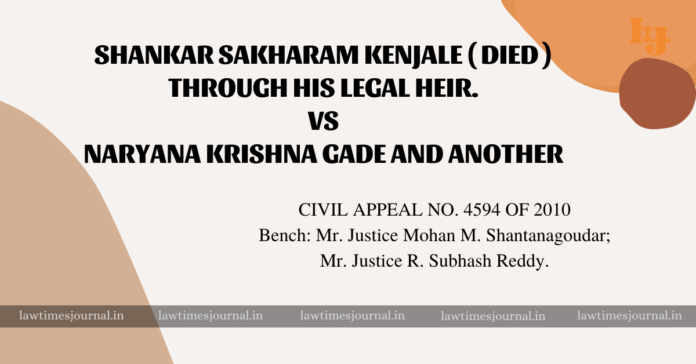
IN THE SUPREME COURT OF INDIA
Civil Appeal No. 4594 of 2010
Petitioner
Shankar Sakharam Kenjale ( Died ) Through his Legal Heir
Respondent
Naryana Krishna Gade and anr.
Date of Judgement
17th April, 2020
Bench
Hon'ble Mr. Justice Mohan M. Shantanagoudar; Hon'ble Mr. Justice R. Subhash Reddy
Introduction:
The land in question was Paragana watan property/Inam land governed by the provisions of the Bombay Hereditary Offices Act, 1874. Smt. Laxmibai, wife of one Bhawani Raje Ghadge, was the watandar of the suit land. She had inducted one Mr. Ramchandra (successor of the Respondents herein) as a permanent Mirashi tenant of the land. Such tenancy was hereditary in nature. Ramchandra (mortgagor) executed a mortgage deed in favour of one Shankar Sakharam Kenjale ( (‘mortgagee’) mortgaging the suit land with a condition of sale for an amount of Rs. 900/- advanced by Shankar Kenjale for the purpose of Ramchandra’s household and personal sundry expenses. Per the terms of this deed, a period of ten years was envisaged for the repayment of the mortgage money and the mortgagee was placed in possession of the suit land.
Issues Raised
Whether the mortgagor’s (Respondents) right of redemption ceased to exist by virtue of the resumption of the suit land under the Abolition Act and its subsequent re-grant in favour of the mortgagee (Appellants)?
Arguments Advanced
Arguments for petitioner
The petitioner’s counsel contended that once the Abolition Act came into force, the suit land vested with the Government and after its re-grant to the mortgagee, he became the absolute owner of the land and all rights of the Mirashi tenant–– mortgagor, including the right to redemption, came to an end.
The failure on the part of the mortgagor to pay the occupancy price and seek a re-grant is not fatal to his rights as a Mirashi tenant as the tenancy in his favour continued to subsist despite the introduction of the Abolition Act.
Arguments for respondent
The respondent’s counsel contended that the benefit obtained by the mortgagee by virtue of the re-grant must accrue to the Mirashi tenant––mortgagor by drawing attention to the proviso to Section 3 of the Abolition Act & the Watan Act and therefore his rights as a mortgagor also continued to survive despite the re-grant in favour of the mortgagee.
Observation & Decision
the rights of Ramchandra, who was a lawful permanent Mirashi tenant, survive resumption of the suit land to the Government by virtue of the proviso to Section 3(3) as well as Section 8 of the Abolition Act. This is because the tenancy created in favour of the Mirashi tenant subsisted as on the day on which the Abolition Act came into force, thereby implying that his tenancy rights were protected and continued to be governed by the Bombay Tenancy Act despite the introduction of the Abolition Act. This is well-aligned with the general primacy accorded to tenancy laws over other legislations, as is also reflected in Section 8 of the Abolition Act. Thus, it is amply clear that the rights of permanent tenants over watan lands were intended to subsist even after the coming into force of the Abolition Act.
Edited by Sree Ramya
Approved & Published – Sakshi Raje








